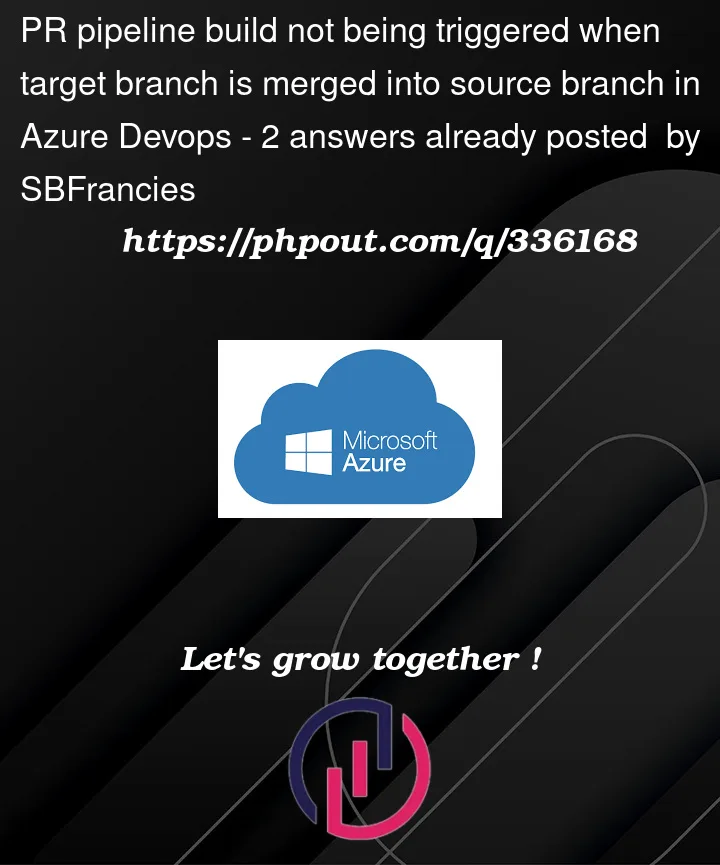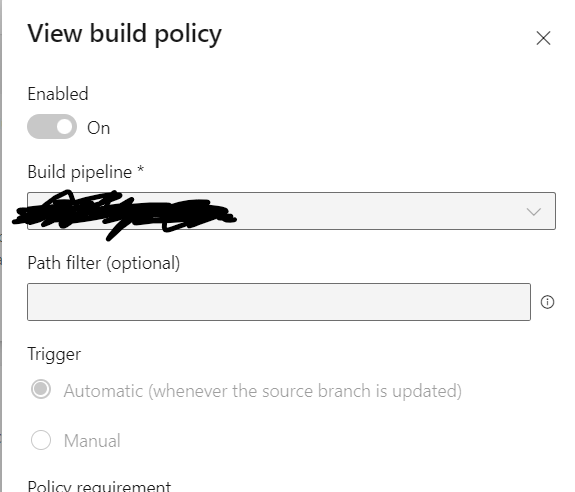We have a git repo in Azure Devops with a main branch and feature branches. We use a strategy was follows for releases:
- Create
featurebranch frommain - Make changes in
featurebranch - Merge in any changes that have been pushed to
maintofeaturebranch - Test and deploy
featurebranch - Merge feature into
main(via PR)
We have a deployment pipeline in Azure Devops with stages for build, test and deployment. The pipeline is triggered when a PR is created to merge the feature branch in the main branch. The instance of the pipeline gets cancelled and a new instance triggered when changes are pushed to the feature branch whilst the PR is open. This has meant that there is always an up to date pipeline for the PR we can release from and this strategy has been working for over a year.
This is our branch policy for the main branch which triggers the pipeline based on a PR with main as the target:
Recently we have had two instances where the pipeline has not been cancelled and retriggered after changes have been pushed to the feature branch. Specifically this has happened when changes from the main branch were merged in whilst the PR was ongoing. Releasing from the active pipeline would have caused a version of the service with the changes from the feature branch but without the latest changes from main. It was necessary to cancel and manually retrigger the pipeline.
I was wondering if this is new behaviour and if it can be circumvented, it is possible that it has always been this way but after hundreds of releases I think we would have come across it before.





2
Answers
This is the expected behavior.
When you have a PR between feature and main, the build that is triggered is a merge representation of the two.
So, when the feature branch got updated with the "new" commits from main, it didn’t trigger the build again because there was nothing new to check, as this has been checked already in the previous run.
I can reproduce your issue. After testing, I found the following:
featurebranch, the pipeline will be triggered. At the same time, I completed the PR merging frommainbranch tofeaturebranch. But at this time, the pipeline will not be triggered by the commit frommainbranch.mainbranch into thefeaturebranch after the pipeline is completed: When there are changes in the commit frommain, the pipeline can be triggered at this time. When there isn’t any change in the commit frommain, the pipeline will not be triggered.newfeaturebased onfeature. Commit infeaturebranch, the pipeline will be triggered. At the same time, merge fromnewfeaturetofeature, the old run will be canceled and a new run will be trigger by the commit fromnewfeature.If there is nothing new for
mainbranch when merging frommainbranch tofeaturebranch, then for the second case I listed, it seems that the pipeline should not be triggered either.As a workaround, it’s suggested that you could merge your
mainbranch tofeatureafter the pipeline is completed.I didn’t pay attention to the previous behavior. If merging from
mainbranch tofeaturebranch previously would cancel the old run and trigger a new run, I suggest you report this issue to the Azure DevOps support on Developer Community to confirm if there is any change or it’s bug.